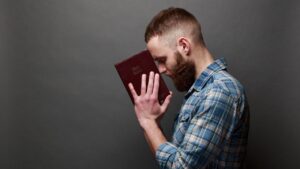
A few summers ago at a writers’ retreat, our group of 11 gathered to pray. Each attendee prayed for the woman to her right. As my turn grew closer, my angst grew greater. What should I pray? I anxiously wondered.
Another time when our church small group leader asked for somebody to close in prayer, I was too scared to volunteer. I wanted to pray. I’m honored to pray. And yet, I often feel nervous to pray aloud in front of others. How can we overcome these insecurities?
1. Pray as part of God’s family.
Once when I expressed my fear of praying in front of others, our pastor gently encouraged me—“We are for you.” We, the body of Christ, are not tied together by the ability to utter profound thoughts or smooth words but by Christ himself. When we fear saying the wrong thing, we can rest in the reality that we’re praying with family.
We are not tied together by the ability to utter profound thoughts or smooth words but by Christ himself.
Christ is for us, and in him, we are for each other. Since he is the tie that binds, we’re more equipped to pray for and with our spiritual siblings than we realize. Even if we flail about, we can remember that we’re having a family conversation with our Father. And we can draw great confidence from the truth that our “Father knows what [we] need before [we] ask him” (Matt. 6:8).
2. Pray the prayers you pray when alone.
Most prayer takes place outside of a formal church context: in our homes, in our cars, in the coming and going—when we get a text from a small group member or when we see a sister with her head down. When we’re gathered with other believers, we can pray those same, simple prayers that the Lord leads us to pray when we’re alone. We don’t need to come up with new ideas or use more sophisticated language just because others can hear us.
3. Pray Scripture.
Perhaps you struggle to know what to pray at all, whether alone or in a group. Or maybe your prayers flow freely when you’re alone and your mind goes blank around others. Praying Scripture can help.
Consider different psalms as an outline. For example, work from Psalm 51’s framework: “Create a pure heart in us, O God. Help us to be steadfast in seeking you, in meeting, in caring for one another, in serving our neighbors. Restore the joy of our salvation. Grant a willing spirit to sustain us, our dear ones, our community.”
We can also pull from the letters in the New Testament, like Colossians 1:10: “Lord, help us to walk in a manner worthy of you, fully pleasing to you, bearing fruit in every good work and increasing in our knowledge of you.”
We can and should thank God for his character as delineated in Scripture. For example, we can follow Isaiah 40: “Lord, you are the everlasting God, the Creator of the ends of the earth. You do not faint or grow weary; your understanding is unsearchable. You pardon our iniquity. You renew our strength. We are faint and weary. Help us wait on you.”
4. Pray with one.
If you’re scared to pray aloud with a group, start by praying aloud with one person. You might find someone to serve as a prayer partner and pray together in person or over the phone. Or you might simply begin praying aloud in your home when a spouse, child, or roommate is in earshot. We may be surprised by how beneficial it is for those in our household to overhear our internal prayers externally expressed. We may be even more surprised by how beneficial it is for us to hear our own prayers spoken. Routinely verbalizing our prayers can help us feel more comfortable when we pray out loud in a group.
5. Pray with eyes on Christ.
The most freeing aspect of prayer is that its power doesn’t depend on us. It’s not eloquent phrases or many words that make us heard; it’s the blood of Christ (Matt. 6:7). The ultimate way to overcome our insecurities about praying aloud is to confess them to our Great High Priest who sympathizes with our weaknesses and promises to help us in times of need (Heb. 4:16).
The most freeing aspect of prayer is that its power doesn’t depend on us.
Whether it’s run-on sentences, a planned prayer that God led us to write, confession through tears, or the simple repetition of “thank you, Lord,” we can glorify God when we pray aloud with others. Be willing to be uncomfortable. Be willing to be exposed and awkward—our bodies are living sacrifices. Even when we utter messy prayers, we can offer them to the Lord as our spiritual worship.
Source: The Gospel Coalition




